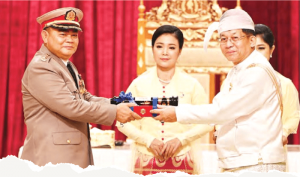(ATF) The Indian Premier League (IPL), the country’s popular and glitzy one-day cricket league, has bagged a new title sponsor, with Dream 11 grabbing sponsorship rights for the IPL’s 2020 tournament.
The news ends two weeks of uncertainly following Vivo’s sudden pull-out following the deadly clash with Chinese troops on the two countries’ Himalayan border in June.
Yet, despite being “a homegrown Indian brand”, and striking a win-win deal, it seems that Dream 11, and the league owner, the Board of Control for Cricket in India (BCCI), could face a hard time shrugging off the current stigma against Chinese companies.
For Tencent Holdings, the Chinese Internet giant and fantasy sports powerhouse, has reportedly invested over $100 million in Dream 11 that has resulted in a majority stake in the Mumbai-based venture, while co-founder Harsh Jain has just a 35% stake. This technically makes Tencent the de-facto owner.
And already the Confederation of All India Traders (CAIT), an association of 700 million traders across the country, has written to the BCCI, raising concerns about Dream 11’s Chinese backing.
Read more: Chinese firms in India face an uncertain future
“We are deeply pained to note that now Dream 11 has been chosen as sponsor of IPL 2020, which is having Chinese company Tencent as one of the major stakeholders,” CAIT said in a release on Wednesday (August 19).
CAIT has argued that Dream 11’s inclusion as backer of the league could clash with India’s ‘Vocal for Local’ sentiment, that essentially discourages Chinese participation directly or indirectly in the country.
The source for this communal anger was the clash between Indian and Chinese troops on the Ladakh border in June, when 20 Indian soldiers lost their lives. CAIT also objected to Vivo being title sponsor of the IPL2020, which forced the Chinese handset brand to pull out two weeks back.
Win-win deal
Nevertheless, Dream 11’s ability to gain naming rights is undoubtedly a win-win for both the company and the tournament.
“Having bagged the title sponsorship of BCCI from Vivo, Dream 11 has not only gained the bragging right of emerging as a fantasy sports leader in India, but it has also catapulted fantasy gaming as one of mainstream industries in India,” a senior fantasy gaming executive told ATF, but requested anonymity because he is not the authorised spokesperson.
This source heads an Indian fantasy gaming venture with a huge Chinese investment, and claims to be a payment-platform provider to “95% of the fantasy gaming players in the country.”
For BCCI too, bagging Dream 11 as a title sponsor to replace Vivo would also be a relief, according to Anil Wanwari, a fantasy gaming expert and the founder of AnimationXpress, a fantasy gaming and animation portal.
That’s because the money-spinning cricket tournament is scheduled to start in the United Arab Emirates from next week. Time was running out and the BCCI had to choose a title sponsor quickly.
“Dream 11, after all, was the highest bidder in the fray after the Vivo exit,” he said.
According to reports, the other close contenders for the title sponsorship were Unacademy and BYJU’s – two online learning platforms – and the multi-billion-dollar industrial conglomerate Tata Sons.
However, while Tata Sons pulled out early, Unacademy’s highest bid for sponsoring the event this year was reportedly $28 million, while BYJU’s was lower, at $20 million.
“But Dream 11 agreed to pay close to $30 million to BCCI, which is roughly half of what Vivo was paying. So, it’s a win-win for both,” Wanwari told ATF.
Fantasy gaming taking off
That aside, according to the industry executive who requested anonymity, the deal also gains significance for “thrusting fantasy gaming into the limelight.”
According to Teague Orgeman, CEO and co-founder of Starting 11, a US-based fantasy and online gaming platform, India is currently one of the largest and fastest-growing fantasy sports markets in the world.
For decades, the US has been the leader in fantasy sports but India has surpassed that with millions of new users being added year over the year, Orgeman said.
Dream 11, for instance, claims that since June 2018 the number of users on its platform has risen from 4 million to 50 million in December 2019. Currently, the platform has a user-base of over 80 million.
The company is also valued at over $1 billion, making it a “Unicorn” in the start-up world.
A recent FICCI-EY report suggested the online gaming industry will see an annualised growth rate of nearly 43% over the next three years.
“In 2019, the online gaming segment retained its position as the fastest growing segment on the back of transaction-based games, mainly fantasy sports, increased in-app purchases and a 31% growth in the number of online gamers to reach around 365 million. This represents a 14x growth since 2010, when there were 25 million gamers,” the FICCI-EY report said.
























